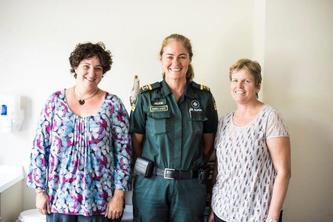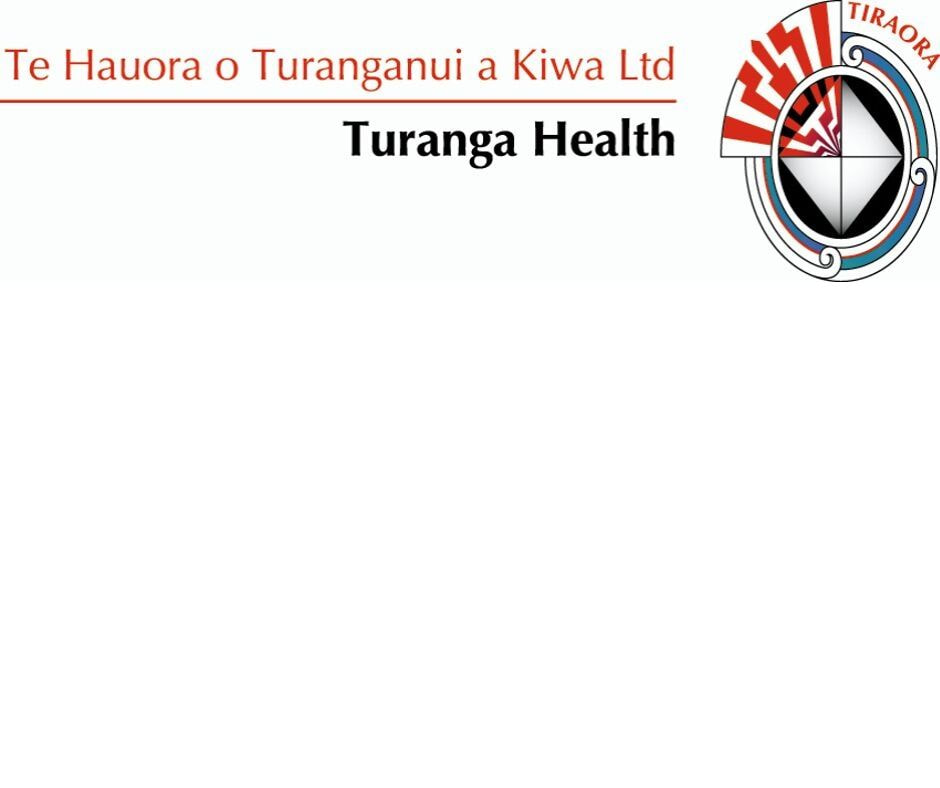 Some patients at a rural Gisborne medical centre hesitate when they see St John intensive care paramedic Jackie Clapperton in her distinctive dark green uniform. She’s standing where their GP normally stands indicating they can take a seat and tell her why they’ve come! “But once I introduce myself and explain that I can help them just like a GP can, they relax. I think the public has come to know and trust the St John green strip for medical emergencies and care, and they know I am a professional.” Jackie is widely known around Gisborne as a dedicated, brave and extremely professional ambulance paramedic. She’s been dangled out of helicopters, provided life saving care in people’s homes and in remote bush settings, and attended some of the worst car crashes imaginable. But she is also a nurse practitioner – a nurse who has completed years of advanced education so she can provide a wide range of assessment and treatment, and prescribe medication. Jackie is the only St John intensive care paramedic/nurse practitioner in the country and now she is breaking new ground at the tiny medical centre in Te Karaka owned by Turanga Health. “Jackie is the first nurse practitioner we’ve employed to back fill a GP on leave,” says Turanga Health Reweti Ropiha. “Our general practice is just over 30km from Gisborne and it’s getting harder and harder to staff when key staff are away. This is the first time we’ve thought to use a nurse practitioner. It’s a huge step forward for seamless provision of healthcare in a rural setting.” Jackie is working at the clinic for just over a fortnight and was thrilled to take on the role. “I have to admit I jumped for joy when the opportunity arose” says Jackie. I’ve been lucky enough to integrate my nurse practitioner role into what I do at St John, but I didn’t expect to ever be working at a rural general practice, she adds. As a St John intensive care paramedic Jackie works at the highest level for the ambulance service and is a specialist in critical care and clinical judgement, with a proven ability to manage complex patients. After seven years as an emergency department nurse, and 15 years in the ambulance service, she is capable of delivering a wide range of medicines, advanced airway management, and a number of invasive skills. Jackie says she took on the challenge of qualifying as a nurse practitioner because someone told her she wouldn’t be able to do it. “That fired me up. I am not an academic, but I am good at practical things, I am good at forward thinking, planning the next step, joining the dots during an emergency situation, and so I kept on doing the papers and reaching the next step”. The 44-year-old mother and grandmother says she received lots of help along the way and in her new short term role at Te Karaka she is surrounded by a supportive medical fraternity. Senior nurses at the clinic are integral to helping care for each patient; Gisborne Hospital staff know her well and recognise her right to prescribe and order tests and imaging; and now radiology staff in the district, whom she is new to, are also supporting her. In Gisborne, large general practice Three Rivers Medical is on hand to answer any questions Jackie may have. “I have contacted them a couple of times just to confirm that what I am thinking is correct.” Three Rivers Medical GP Fergus Aitcheson mentored Jackie’s drug management and prescribing during her nurse practitioner training and is thrilled she has the chance to work in the Turanga Health medical centre.“Her patient assessment skills are very sound and I think it’s an ideal situation out at Te Karaka.” He says Three Rivers Medical has a long standing relationship with Turanga Health and this, as well as his mentoring relationship with Jackie, means he’s happy to be at the end of the phone should Jackie need. “I have always thought that any new prescriber, be it junior doctor or nurse practitioner, should have the ability to easily refer to an experienced prescriber when starting out because drug prescribing has pitfalls which can be hazardous. But in this situation, I wouldn’t expect the reason I hear from her to be anything more than a nuance of drug management or test interpretation.” Dr Aitcheson says it is in everyone’s best interest for each part of the health system to support the other. Nurse Practitioner New Zealand chair Jane Jeffcoat says what’s happening in Te Karaka is a sign of the “maturity” of the health environment whereby nothing is the sole domain of one type of practitioner. “You’ll find that most people working in health prefer working collaboratively in order to achieve the best health outcome for the patient”. Ms Jeffcoat says Turanga Health should be applauded for its decision to contract a nurse practitioner to cover for staff away on leave. It may be a unique situation for Turanga Health but there has never been any reason that a general practice team can’t be made up of either a general practitioner and/or a nurse practitioner along with registered nurses and other health professionals. Of the 150 nurse practitioners currently working in New Zealand, about a third of them are working in primary health. However Ms Jeffcoat says nurse practitioners in some places continue to be underutilised in what they can do. “The nurses are working to their capacity and they can provide a service just as well as the GPs can, within their knowledge and boundaries." St John Central Region General Manager Dr Sharon Kletchko says Jackie has worked to develop valuable relationships with local health providers and community leaders, ensuring that care and support is available to people in need. “The role of nurse practitioner provides a vital link between St John and local communities in Gisborne and surrounding areas. St John is pleased with what the role of nurse practitioner has achieved in a relatively short period of time and looks forward to its ongoing evolution.” Back in Te Karaka Jackie has just helped a mum whose young child who presented with a rash consistent with shingles. After confirming this diagnosis with the help of a GP at Three Rivers Medical and a photograph, Jackie prescribed the appropriate medicines. She is loving the job and is gaining more experience and knowledge every day. “It’s a lovely environment to work in and it matches my goals which have always been to make the patient experience fluid and seamless whether first contact be in an ambulance or in a general practice.”
0 Comments
 In a first for Turanga Health, its Te Karaka medical centre has nurse practitioner Jackie Clapperton filling in for Dr Mark Devcich while he is away on leave. Jackie is widely known on the East Coast as a dedicated, brave and extremely professional St John ambulance intensive care paramedic. But she is also a nurse practitioner – a nurse who has completed years of advanced education so she can provide a wide range of assessment and treatment, and prescribe medication. Jackie is the only St John intensive care paramedic/nurse practitioner in the country and now she is breaking new ground at the tiny medical centre in Te Karaka owned by Turanga Health. Jackie, who wears her distinctive dark green St John uniform while at work in Te Karaka, will be working in the clinic for the rest of the month. A more in-depth article on Jackie, her background, and comment from those who have supported her during her training, is coming soon.  Dr Simon Spenceley from Three Rivers Medical attended the Turanga Health Treaty of Waitangi training. Dr Simon Spenceley from Three Rivers Medical attended the Turanga Health Treaty of Waitangi training. Seventeen Gisborne GPs now have a better understanding how the Treaty of Waitangi affects their work after spending a unique evening with Māori health provider Turanga Health. The Tuesday evening training which began with a shared meal and ended with a bus tour, covered critical issues relevant to the Treaty of Waitangi, it’s historical, and contemporary, context. The focus was on analysis and interpretation of the way in which the Treaty can be applied to contemporary health situations. GPs who attended all work at medical centres that are part of Midlands Health Network (MHN). MHN provides doctors, nurses, and other health staff in this district with tools they need to get the best health outcomes for patients. Turanga Health is part of MHN. For one Gisborne GP, Simon Spenceley from Three Rivers Medical, the experience was distinctive. He described it as “an informative and enjoyable meeting illustrating the history and diverse interpretations of the Treaty.” It was the first time Turanga Health has offered the training on behalf of MHN, and Turanga Health CEO Reweti Ropiha says it’s something they’ve wanted to do for a long time. “It was important to us as a partner in MHN that the local perspective of the Treaty be front and centre. The Treaty provides a framework for Māori and non-Māori to exercise control over their health and wellbeing. The key parts we wanted to address last night were understanding the Treaty, and addressing inequities in health care.” Mr Ropiha says it was refreshing to be applying the three Ps of the Treaty: partnership, participation and protection, in real time. “Equally important was sharing some of the history of this region with the GPs. And that’s why we took them on a bus tour,” adds Mr Ropiha. GPs took a short bus tour up over Kaiti Hill. The trip was narrated by Ripeka Winitana who has an avid interest in local Maori history and tikanga. Dr Spenceley said the entire evening “was made all the more interesting by the interactive bus trip”. Turanga Health looks forward to sharing more local Maori history with the GPs later in the year when it showcases a new-look activity programme combining exercise with heritage trails and information for participants. Ends |
Media Releases
Email us if you want to receive our media releases. Archives
February 2024
|


